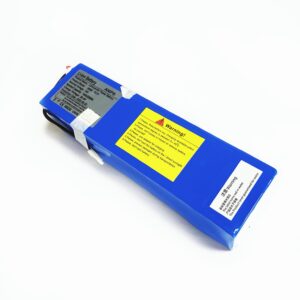Introduction
18650 lithium batteries and cells have been gaining popularity in recent years due to their powerful performance and long life cycles.
The 18650 designation refers to the size of the battery cell, which is 18mm in diameter and 65mm in length. These batteries boast superior energy density and stability compared to other types of lithium-ion cells, making them ideal for a wide variety of applications including electric vehicles, power tools, and medical devices.
In this article, we are going to take an in-depth look at the benefits of 18650 lithium batteries and cells. We will explore how they can be used more effectively and efficiently compared to other types of batteries, as well as dive into the reasons why they have become so popular. We will also discuss some tips for maximizing their use so that you can get the most out of your 18650 cells.
What Is a 18650 Lithium Battery?
I’m sure you’ve heard of lithium batteries before, but 18650 lithium batteries and cells take it to another level. In short, these are rechargeable batteries that are cylinder-shaped and generally measure 18mm in diameter by 65mm in length. They house a nominal voltage of 3.6 or 3.7V and can range from 1200mAh to 3500mAh capacity.
These kinds of batteries and cells are used in a variety of applications such as LED flashlights, portable electronic devices, laptops, power tools, electric vehicles (EVs), home energy storage systems (ESS) and more. Moreover, they are also known for their reliability—they feature constant output voltage delivery until drained—as well as their longer lifespan and faster charging capability compared to other types of batteries like NiCad or NiMH.

Advantages of 18650 Lithium Batteries
As a battery aficionado, I’ve been particularly impressed with 18650 lithium batteries and cells. After doing extensive research on the topic, it became clear why these batteries are so often chosen for high performance equipment.
First and foremost, 18650 batteries have a high energy density. They store more energy than other batteries of the same size, making them more efficient and longer lasting. This means you can get by with fewer battery replacements, saving time and money in the long run.
In addition, 18650 cells boast excellent safety characteristics. They have short-circuit protection, over-charge protection and over-discharge protection to ensure that you don’t cause any damage to your equipment or pose a safety risk in any way while using them.
They also remain stable at high temperatures yet still perform well in cold weather. And, because they can be recharged up to 500 times before needing replacement, they’re an excellent economical choice overall.
Disadvantages of 18650 Lithium Batteries
Although 18650 batteries are praised for their high energy density, they do come with a few disadvantages.
Costly
The cost of lithium-ion cells is higher than that of other types of batteries, due to the material costs associated with producing them, as well as the production process itself. Due to the high cost, 18650 batteries are typically used in specialized devices and applications.
Bulky
18650 batteries are usually larger than other types of battery cells, making them less suitable for products where size or weight is a concern. While this can be an obstacle in some cases, the increased energy density helps to make up for it in others.
Vulnerable to Impact Damage
The 18650 battery cell is vulnerable to mechanical damage due to its lightweight and fragile nature. Therefore, care must be taken when using and transporting these cells in order to prevent damage and ensure safe operation.
How to Charge and Care for 18650 Lithium Batteries
When working with 18650 lithium batteries and cells, proper charging is an absolute must. It’s important to know what type of charger you need and how to use it properly.
Charging Equipment
The two main types of chargers are smart chargers and regular chargers. Smart chargers are the best option for 18650 batteries, as they are able to detect when a battery is fully charged, thus protecting it from overcharging. Regular chargers will not turn off once a battery is fully charged, and can cause damage to the cells if left on for too long.
Charging Process
It’s also important to be aware of the charging process. When charging 18650 cells in parallel, pay special attention to the total capacity of the battery pack and make sure that each cell is balanced through equalization. This prevents overcharging of one cell while undercharging another, which can lead to an imbalance in voltages and a decrease in overall performance.
Finally, it’s important to take regular maintenance measures to ensure your 18650 lithium batteries are functioning properly every time they are used. This includes properly storing them at the correct temperature and monitoring their charge cycles so they don’t dip into too deep levels of discharge. With the right care and attention, you can ensure your 18650 lithium batteries will last many charge cycles without having any issues!
Different Types of 18650 Cells
When it comes to 18650 lithium batteries and cells, there are several different types of cells available on the market. These include PRIMARY, SECONDARY, and PROTECTED 18650 lithium cells. Each type has its own unique characteristics and benefits that make it ideal for different applications.
Primary Cells
Primary cells are not rechargeable and only supply energy for a single charge cycle. They have a higher capacity than most other types of cells, so they are often used in applications such as flashlights and medical devices where a long-lasting charge is needed.
Secondary Cells
Secondary cells are rechargeable and can be used for multiple charge cycles over the lifetime of the cell. They have an average capacity that falls between primary cells and protected cells, so they are typically used in applications such as electronic cigarettes, drones and portable electronics.
Protected Cells
Protected cells offer a higher level of safety compared to other types of 18650 lithium batteries due to their built-in protection against overcharging, overdischarging and short circuiting. As such, they can be safely used in applications such as electric bicycles or laptops where high levels of reliability are necessary.
Common Applications for 18650 Lithium Cells

18650 lithium cells are becoming increasingly popular in a variety of electronics applications, due to their thin, lightweight design and longer battery life. Common applications include:
Portable Electronics
18650 lithium cells provide the perfect combination of power and portability for a wide range of portable electronic devices. These include smartphones, digital audio players, laptop computers, medical equipment and handheld gaming devices. These cells are also ideal for use in outdoor wearables, such as GPS receivers, bike computers and pedometers.
Electric Vehicles
The use of 18650 lithium cells in electric vehicles is on the rise. These batteries are well suited for electric vehicles due to their light weight and high energy density. They also have a low self-discharge rate which allows them to retain charge even when not in use. This means they can handle the frequent recharging requirements associated with electric vehicles without having to be replaced regularly.
Power Tools
18650 lithium cells are becoming a popular choice for powering cordless tools such as drills, saws and generators. Their low self-discharge rate makes them ideal for applications where the tool is only used intermittently over long periods of time – such as on construction sites or remote locations where regular recharging may not be available.
Conclusion
When it comes to 18650 lithium Battery and cells, the benefits are plentiful. The high energy density, long-lasting service life and ease of use make these cells popular among hobbyists, the electronics industry and other commercial uses. From the ability to be recharged hundreds of times to the wide range of lifespans, it’s easy to see why 18650 lithium batteries and cells have been viewed so favorably. Safety and cost-saving are two more attributes worth noting, making them ideal choices for any application where power and performance are necessary. With the advantages of lighter weight, increased safety, longer life, and higher wattage, 18650 lithium batteries and cells are here to stay.

